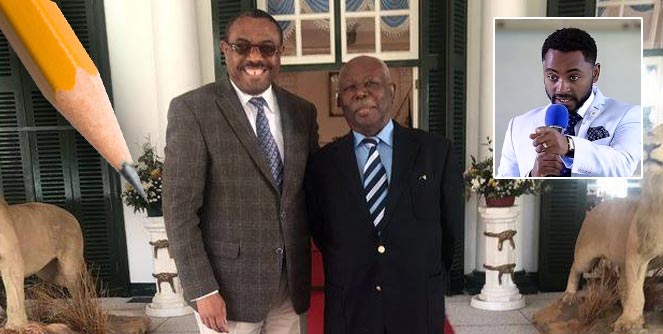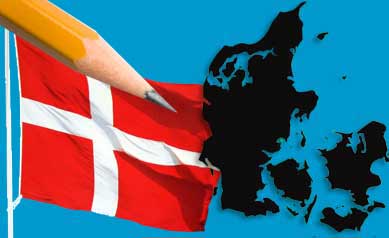Pm Abiy and the Rehabilitation of Dictators

Just as Eritreans were reeling from the bizarre remarks Isaias Afeworki made during his visit to Ethiopia on July 14, they were stunned by another man who claims to be a prophet, a healer, and an exorcist ranting about how the Gospel will be victorious, in front of the Asmara Palace Hotel, upon his arrival to Asmara from Addis Ababa, aboard the first Ethiopian Airlines flight that landed there after a 20-year absence.
In the middle of the state receptions, the always reticent Isaias Afeworki revealed words that confirmed what many of his opponents long suspected of his attitude towards Ethiopia. He had stated, “anyone who does not think the Eritrean and Ethiopian people are one does not know history… borders do not mean anything”. At the Millennium Hall, he hurled more insult to Eritreans when he emphatically told PM Abiy, “I am not saying this to flatter you … I am sincerely asking you to lead us as I have given you full authority to do so”. Isaias’ childish behavior during that visit, was unbecoming of a head of state. It was an embarrassment even to his ardent supporters who were bewildered, while everyone else wondered about what he said.
Over the last twenty years, many Eritreans have been pointing out at Isaias’ erratic behavior. But during his last visit to Addis Ababa, the whole world witnessed his strange behavior, leaving them scratching their heads and putting his psychological state of mind in question. This is Isaias, the man that US Ambassador Ronald K. McMullen described in a Wikileaks telegram as an “unhinged dictator”. Perhaps, coming out of the dark after 20 years of isolation into relevance and attention, it could have been his euphoric excitement.
As if that shock was not enough, a controversial preacher, who calls himself Prophet Suraphel Demisse, took to the street of Asmara in a rally, unhindered by the Eritrean security forces that do not even allow a private religious congregation of those who share Suraphel’s faith, in a private home. It is worth noting that the first and last time Eritreans demonstrated was in November 2017, when they faced Isaias’ security forces who fired live ammunition at them. The board and students of the AlDiaa private school had protested the government’s interference in their own independent, private school. In a meeting presided by the late Hajji Musa, as has been customary among Muslims the world over for a millennium, the attendants closed their meeting by shouting Allahu Akbar. That was considered an extremist slogan and resulted in the arrest of Hajji Musa, members of the AlDiaa school board, and parents and students, including the underage. In response to that, the staff, students and their parents, and the public demonstrated in the streets of Asmara. They were met with bullets and hundreds were arrested. In April, after almost five months in jail, the nonagenarian Hajji Musa died in prison. At his funeral, the security forces provoked the mourners with their heavy presence and eventually arrested hundreds of the funeral attendants; the whereabouts of most of them is still unknown while a few were released silently.
A few months later, a flamboyant pastor, a charlatan who exploits gullible followers with his riveting, and often hyperbolic, fiery sermons appeared in Asmara. The charlatan is also known for his theatrics, as a man exhorts people to crawl like snakes (as shown here), and thereafter claims he turned them into humans again, after ejecting evil spells that lived in their guts in the form of a snake and thus claims to have freed their possessed bodies. Such practices belong to the ancient times. In the past, people didn’t have explanations for unknown mental and physiological maladies and resorted to witchcraft and exorcism to ward off evil spirits, in what was known as the “Buda” phenomenon. Now, this charlatan and many others like him who burgeoned in Ethiopia in the last 27 years, are practicing witchcraft assisted by modern gadgets, such as television, sound effects, camera tricks and collaboration of cruel actors, or gullible ignoramus audience.
Such imposters are simply copycatting the USA televangelist phenomena of 1980’s and 90’s, who virtually disappeared after many of their prominent leaders were embroiled in financial and sexual scandals. They ultimately fell out of grace and some of them ended up in prison.
It only Takes Few Bad Apples
Last year, the pastor in question mocked attendants of the Oromo’s Irreecha cultural-festival near the city of Debre Zeit, by calling them worshipers of a river. He was roundly criticized by the Oromo religious and civic leaders.
We are apprehensive of the guy who thinks other people of faith, particularly the Orthodox Christians, are not genuine and have to become Christians again. We know that the “Ancient Orthodox Christianity” has not produced modern-day flashy entrepreneurs of televangelism with gaudy suits who mesmerize audiences and air their skits on television, but it’s traditionally homegrown, a spiritual and a genuine faith, and it has more history and gospels than the rest of the world.
Last April, a certain evangelical denomination known as the Ethiopian and Eritrean Church Fellowship held a conference in Oslo. The conference was attended by Eritrean and Ethiopian evangelists living in Europe. The pastor joined hands with others in the opening prayer which was led by Dani Belay, a self- described pastor, who said: “our forefathers chose to unite with Ethiopia so as not to be dominated by Muslims”. He later tried to walk it back by issuing an apology but dug a deeper hole for himself by claiming that people misunderstood what he said while there is nothing unclear of what he said in the video. Rather than praying and calling for the release of the imprisoned Eritrean evangelicals, the attendees praised PM Abi Ahmed and prayed for Isaias Afwerki, the jailer of many evangelicals. Worse, while they discussed and hoped for a good relationship in the future of the two countries, there was no mention of the religious persecution or the presence of prisoners of conscience that are so prevalent in Eritrea.
Just like all other religions, devoted evangelical Christians have their share of religious imposters who present themselves as miracle healers to swindle poor people. All religions, with no exception, suffers from the action of a few of their own followers who give them a bad name. History is replete with those who hide bad behavior and corrupt politics behind their religious veil. We are well within our rights to oppose any form of prejudice, bigotry, and denial of rights of others by any individual or organization, religious or otherwise, that hides under the cloak of religion to prop up a dictator. At the same time, we are heartened to see many of our patriotic evangelicals denouncing such ugly behavior by issuing a ‘not in my name’ statements.
Religious freedom and freedom of expression are sacrosanct to Eritreans who pursue goals of justice and freedom. However, the politics of divide-and-rule is infringing on that noble idea that is held by all freedom-loving human beings. Eritreans have suffered a lot, and are still suffering from Ethiopian interference in their internal affairs. The political cracks they penetrated through were, unfortunately, opened by some Eritreans. The current situation is not different from the experience that Eritrea went through sixty-years ago, and it’s worrisome that such an act is being repeated today.
Allowing Suraphel to hold a rally in Asmara is a reckless act that calls for a civil strife, and religious provocations that would engulf the entire region, just like imprisoning the faithful; and the PFDJ government is a reckless entity and certainly takes the blame for anything that might ensue due to that.
The Moral Litmus Test
There are several questions that arose concerning Suraphel’s rant in Asmara: was all of that coincidental, or was he given a prior license to carry out his evangelism on the streets of Asmara where no other religious group is allowed to demonstrate? Under the PFDJ rule, Asmara is not known to accommodate any religious expression outside of prayer houses, particularly the Pentecostals, whose Eritrean preachers are languishing in jail, and the sect is banned from any public expression of their faith. How would anyone who is supposed to know the state of affairs in Eritrea to be bold enough to fly in aboard the first flight to be received by crowds who seemingly were notified of his arrival? That was not coincidental, and it is difficult to think the security forces did not know about it. Or, was it a deceptive show of tolerance to cheating the world that Eritrea respects religious freedoms? Perhaps, the relaxing of the security regiment was a gesture to appease the current Ethiopian prime ministers who is an evangelist! In addition, Hailemariam Desalegn, the former Ethiopian Prime minister, who is also an evangelist, was in the same flight and warmly greeted Suraphel on the airport tarmac. Incidentally, the seemingly calm and humble ex-prime minister was last sent to Harare, to meet Mengistu Hailemariam, the ex-Ethiopian dictator who lives in Zimbabwe since he was granted asylum by Mugabe. It is worth remembering that Mengistu is wanted by the Ethiopian courts that tried him in absentia for the crimes he committed on Eritreans and Ethiopians.
Hailemariam Desalegn was infatuated when he met Isaias, heaping praise and describing him as a modest person. He didn’t make such absurd pronouncements regarding Mengistu Hailemariam when he met him in Harare, instead, he posted a photo he took with the ex-dictator in a sort of on your face disrespect to the victims of the bloody dictator, the head of the overthrown (and defeated) Derg regime. It seems he couldn’t take the heat of criticism and condemnation that he faced, he had taken the picture off a few days later. For those who are busy trying to rewrite history (the recent history at that), the defeat of the Derg came at a very high cost to Eritrea and Ethiopia. Many of the Derg’s victims are boiling with rage due to the statements and cozying up with the new Ethiopian prime minister with past and present dictators. He is in a rehabilitating drive, polishing dictators, emboldening hegemonic aspirations of some groups, and pushing anti-peace elements of the region to the fore.
Suraphel had expressed his plan to continue preaching his inflammatory messages across Eritrea as he does in Ethiopia. He also indicated he had an appointment to meet with the Eritrean government officials and was planning to meet with other evangelist leaders in Asmara. But it seems, according to his own testimony (on YouTube), he was stranded in his hotel room for three days awaiting the next flight back to Addis Ababa. Why was he locked in his hotel? Was he ordered to stay there, or it was on his own choice? Judging from his earlier enthusiasm upon arrival in Asmara, we suspect the former.
There are also important points that need answers: Would Ethiopians visiting Eritrea be able to hold rallies and demonstrations in support of their persecuted fellow Christians or Muslims? Would Eritreans in Ethiopia be able to peacefully oppose the Isaias regime in the streets of Ethiopia? How about the close to 200,000 Eritrean refugees who, according to UNHCR live in camps in northern Ethiopia? Would PM Abiy Ahmed recognize them as refugees and allow them to stay in Ethiopia? If he does, would he truly understand the reasons why they escaped the very dictator he calls my brother, and for whose longevity he prays? If he does not, would he go against the international law and expel them to appease Isaias? And how would the regional government of Tigrai react to any change of policy? Will Ethiopians tourists enjoy the beaches of Massawa, as PM Abiy has promised them? Would Isaias allow Eritrean parents to travel to the refugee camps in Ethiopia to see their underage children?
In one of his recent emotional remarks which some described as a drunken blabber, Isaias stated that now he could travel throughout Ethiopia without requiring a permit from PM Abiy, whom he invited to travel throughout Eritrea freely. Would the visiting Ethiopians require travel permits to travel outside Asmara, as is the case for all foreigners, including diplomats?
The coming few weeks will reveal whether the secret peace agreement reached between Isaias and Abiy would withstand its first test and live up to the UAE crown prince’s playbook in his pastime game of chess in the region? Do the two leaders understand Mohammed Bin Zayed’s goals to beat another petrodollar rival Prince Mohammed bin Salman, who also was vying for bragging rights in the region by bankrolling Isaias by replacing Gaddafi who was Isaias’ former patron until the Arab Spring? Would PM Abiy and Isaias live up to the promise they made to end hate, discrimination, and division?
Many Eritreans are skeptical and apprehensive of the entire deal. Firstly, they do not appreciate anyone who tries to rehabilitate their tormentor while they are still being tormented. Thus, Abiy’s flowery rhetoric of love, peace, and forgiveness rings hollow to Eritreans, especially the relatives, colleagues, and friends of those who have been languishing in jail for decades without a trial. Or the tens of thousands who are forced to live for five-decades in the refugee camps of Sudan, Ethiopia, and Yemen… including the hundreds of thousands of exiles living scattered all over the world, who cannot visit their birth country, and even their remains are not allowed to be buried there. Secondly, after the independence of the country, the Eritrean ruling party signed many unannounced agreements with Ethiopia. But less than five years later, even the strategic alliance and close relationship between the two ruling parties, (Eritrean EPLF and Ethiopian TPLF) did not prevent the outbreak of the devastating border war of 1998-2000.




Awate Forum